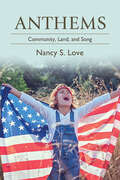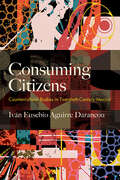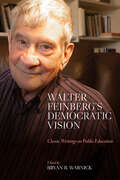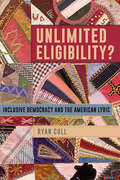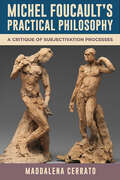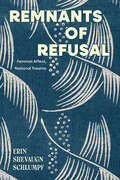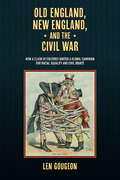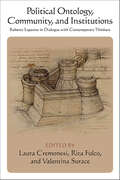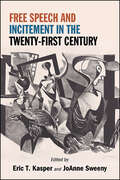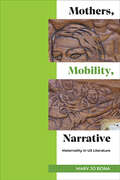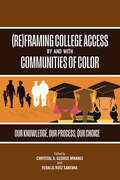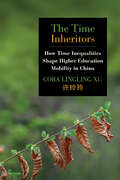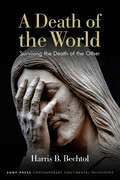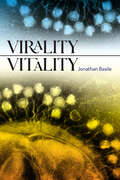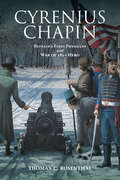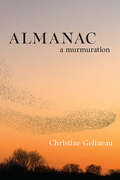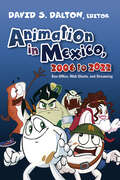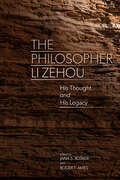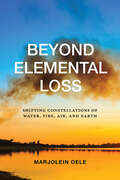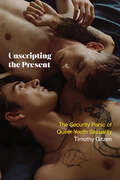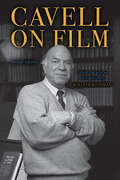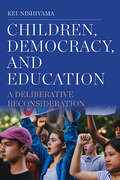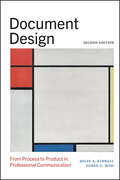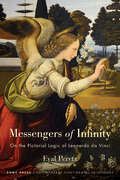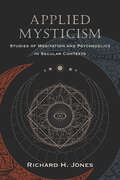- Table View
- List View
Anthems: Community, Land, and Song (SUNY series in New Political Science)
by Nancy S. LoveAn examination of struggles for national sovereignty and social justice as seen through patriotic anthems and songs of resistance.Anthems are songs of loyalty and devotion with religious or quasi-religious meanings, typically associated with nation-states. Singing patriotic songs together encourages a sense of shared identity and unified community among citizens. Anthems compares traditional American anthems, such as "The Star-Spangled Banner" and "America the Beautiful," with anthems of resistance from contemporary social movements, such as Occupy Wall Street, Black Lives Matter, and Standing Rock. Although seldom fully recognized by political scientists, musical song plays a significant role in struggles for national unity and social justice. While America's national anthems celebrate a unitary (white) nation, these alternative anthems challenge the definition of sovereignty as property that characterizes modern Western democracies. They offer an alternative vision of a multicultural democracy still struggling to emerge. Written from an interdisciplinary perspective on culture, economics, and politics best described as critical theory, Anthems is intended for scholars, students, and, most important, citizens.
Consuming Citizens: Countercultural Bodies in Twentieth-Century Mexico (SUNY series, Genders in the Global South)
by Iván Eusebio Aguirre DarancouExplores twentieth-century Mexican counterculture through the lens of pleasure, body autonomy, and music and film undergrounds.Consuming Citizens offers a fresh conception of twentieth-century Mexican cultural production by critically tracing the underside of mestizo modernity. Examining a diverse corpus that includes poetry, song, avant-garde film, and more from the 1920s to '80s, the volume uses queer, feminist, and psychedelic theories to understand counterculture-and especially different acts of consumption-as a way of creating culture and alternative social structures. Practices of consuming media, sex, and drugs become means of generating community among subjects who have been marginalized by the nominally inclusive mestizo nation. Consuming Citizens thus rethinks nationalism, citizenship, and society in relation to, and as creations of, countercultural bodies.
Walter Feinberg’s Democratic Vision: Classic Writings on Public Education (SUNY series, Horizons in the Philosophy of Education)
by Walter FeinbergCollects Walter Feinberg's classic writings on the meaning of democracy for public education.For over fifty years, Walter Feinberg has been a leader in interpreting democracy in and its meaning for public education. In this collection, Feinberg explores the question of how to study education, the necessary role of history and philosophy in this endeavor, and the need for educational theorists to engage with the lived realities of students, parents, and teachers through philosophical anthropology. He demonstrates a particular way of paying attention to public education that brings an interpretive sensitivity for others to the big philosophical questions of what public schooling should be in democratic societies. Feinberg explores many of the central questions that vex educational policy and practice: What should be the purpose of public schools? What should we think of school choice proposals? What are the relationships between religion and public schools? Should schools promote an American identity? How should we think about affirmative action? In this tour of educational ideas, democracy is the central concern, as it both presents questions that demand answers and becomes an approach to studying education with rigor and sensitivity.
Unlimited Eligibility?: Inclusive Democracy and the American Lyric (SUNY series in Multiethnic Literatures)
by Ryan CullRewrites the dominant narrative of the political work of lyric poetry in the United States since the nineteenth century.What if increased visibility of marginalized identities-a goal of much socially committed lyric poetry in the United States-does not necessarily lead to increased social recognition? For many contemporary scholars, this is the central question of lyric politics.Unlimited Eligibility? revisits and deeply historicizes this question. Ryan Cull explores the relationship of a diverse set of poets, including Walt Whitman, Jean Toomer, Hart Crane, James Merrill, Thylias Moss, and Claudia Rankine, to a series of movements intended to build inclusion: the St. Louis Hegelians, cultural pluralism, identity politics, and multiculturalism. In tracing the tensions in lyric poetry's merger with the pursuit of recognition, Cull offers a new history of the political work of lyric poetry while exposing the discursive roots of the nation's faltering progress toward becoming a more inclusive democracy.
Michel Foucault’s Practical Philosophy: A Critique of Subjectivation Processes (SUNY series in Contemporary French Thought)
by Maddalena CerratoOffers a holistic approach to Michel Foucault's thought, introducing the idea of practical philosophy as an original interpretative framework.Michel Foucault's thought, Maddalena Cerrato writes, may be understood as practical philosophy. In this perspective, political analysis, philosophy of history, epistemology, and ethics appear as necessarily cast together in a philosophical project that aims to rethink freedom and emancipation from domination of all kinds. The idea of practical philosophy accounts for Foucault's specific approach to the object, as well as to the task of philosophy, and it identifies the perspective that led him to consider the question of subjectivity as the guiding thread of his work. Overall, Cerrato shows the deep consistency underlying Foucault's reflection and the substantial coherence of his philosophical itinerary, setting aside all the conventional interpretations that pivot on the idea that his thought underwent a radical "turn" from the political engagement of the question of power toward an ethical retrieval of the question of subjectivity.
Remnants of Refusal: Feminist Affect, National Trauma (SUNY series in Feminist Criticism and Theory)
by Erin Shevaugn SchlumpfAnalyzes how French and Chinese literary and filmic texts enact a series of feminist affective responses to the erasure of historical trauma.Remnants of Refusal traces an affective discourse of feminist refusal across a series of French and Chinese works of film and literature. Developing an inventive comparative approach, Erin Shevaugn Schlumpf argues that this discourse takes shape in response to two national traumas and their aftermath: the German Occupation and the Tiananmen Square Massacre, respectively. In both contexts, events associated with the trauma were effectively erased from the official historical record and replaced by an unwritten code of public secrecy. And, in both contexts, three affects-melancholy, ambivalence, and exhaustion-provide means of expressing mourning without breaking the taboo of direct representation. In films and literary texts by Wang Anyi, Chen Ran, Jia Zhangke, Nathalie Sarraute, Marguerite Duras, Jean-Luc Godard, and others, mourning is most frequently borne by and through the bodies of women, generating a broader feminist counternarrative to historical forgetting and burgeoning neoliberalism.
Old England, New England, and the Civil War: How a Clash of Cultures Ignited a Global Campaign for Racial Equality and Civil Rights
by Len GougeonThe first study to document how the Civil War brought about a bitter cultural and political conflict between Great Britain and the United States, a conflict that ignited a global struggle for racial equality and human rights.This study tells for the first time the story of a bitter cultural and political conflict that arose between the leading writers and intellectuals of Great Britain and the United States during the Civil War. The latter were virtually all New Englanders. Ralph Waldo Emerson was a central figure. The British side included such notables as Thomas Carlyle, Matthew Arnold, and John Ruskin. The conflict was focused on the viability of liberal democracy and the notion that "all men are created equal." The question was: What type of social, political, and cultural paradigm was best suited to ensure the advancement of civilization––one in which all have equal rights, regardless of race or class, or one where a small number of privileged white elites exercise a controlling power? The New Englanders embraced the former and the British the latter. The result was a bitter alienation that ignited a global campaign for racial equality and universal human rights.
Political Ontology, Community, and Institutions: Roberto Esposito in Dialogue with Contemporary Thinkers (SUNY series in Contemporary Italian Philosophy)
by Laura Cremonesi Rita Fulco Valentina SuraceFocuses on key aspects of Robert Esposito's thought and explores the ways in which some major contemporary thinkers have been crucial interlocutors in their elaboration.Political Ontology, Community, and Institutions offers a broad view of the current philosophical dialogue in Italy, both in relation to Robert Esposito's own thought and with respect to major issues and authors of crucial philosophical relevance. From his earliest works, Esposito questions the crisis of politics and why thought is unable to convincingly respond to it. He does so by distancing himself not only from political theology but also from those paradigms-destituent and constituent-that have lost nowadays much of their analytical and propositional capacity. However, his proposal is not only critical. Esposito's thought relates to our present through the creation of new categories-among the most recent, those of "instituting thought" and "common immunity"-capable of opening a breach in an apparently increasingly closed horizon. Therefore, dealing with his thought means, first of all, dealing with our present. This is the main goal of this volume, which focuses on Esposito's dialogue with major contemporary thinkers. Also included is an unpublished interview with Esposito conducted by the editors.
Free Speech and Incitement in the Twenty-First Century (SUNY series in American Constitutionalism)
by Eric T. Kasper; JoAnne SweenyExplores the line between free speech protected by the First Amendment and unprotected incitement to imminent lawless action.Free Speech and Incitement in the Twenty-First Century explores the line between free speech and incitement, which is a form of expression not protected by the First Amendment. Incitement occurs when a person intentionally provokes their audience to engage in illegal or violent action that is likely to, or will, occur imminently. This doctrine evolved from World War I through the Cold War and the civil rights movement era, culminating in a test announced by the US Supreme Court in Brandenburg v. Ohio (1969). Since the 1970s, this doctrine has remained largely unchanged by the Supreme Court and, as such, has received relatively little academic or media attention. Since the late 2010s, however, violence at political rallies, armed protests around Confederate statues, social unrest associated with demonstrations against police, and an attack on the US Capitol have led to new incitement cases in the lower courts and an opportunity to examine how incitement is defined and applied. Authors from different perspectives in Free Speech and Incitement in the Twenty-First Century help the reader understand the difference between free speech and incitement.
Mothers, Mobility, Narrative: Maternality in US Literature (SUNY series in Multiethnic Literatures)
by Mary Jo BonaShows how US literary representations of mothering across racial, ethnic, and LGBTQ communities challenge ideological prescriptions about motherhood and maternal love.Mothers, Mobility, Narrative pairs women-identified writers whose work illuminates a range of maternal practices in the face of egregious structural inequalities and obstacles. By using the critical lens of maternal feminism, alongside recent theories of time, space, and memory, Mary Jo Bona reengages the field of motherhood studies to explore linkages between motherhood and movement. Across genres, Harriet Jacobs, Willa Cather, Toni Morrison, Audre Lorde, Kym Ragusa, Carole Maso, Cristina García, and Rebecca Makkai develop maternal figures who, in battling against institutional oppressions in eras of slavocracy, colonialism, dictatorship, and pandemic, expose the fundamentally intersectional nature of social categorization and disrupt traditional discourses of the maternal. Mothers, Mobility, Narrative rethinks maternality across a century and a half of literary expression in the United States, compelling readers to embrace more capacious understandings of maternal subjectivity, care, and kinship.
**Missing**: Our Knowledge, Our Process, Our Choice (SUNY series, Critical Race Studies in Education)
by Chrystal A. George Mwangi; Yedalis Ruíz SantanaOffers novel frameworks and models for understanding college access and choice among communities of Color.This much-needed volume brings together academics, practitioners, students, and community members of Color to thoroughly reframe college access and choice in research and practice. Enrollment rates continue to differ substantially by race and ethnicity. While Black, Indigenous, and other People of Color remain inequitably stratified in the pursuit of higher education, many models of college choice are simply insufficient for understanding the college-going processes of diverse students. Continually centering BIPOC knowledge, assets, and needs, contributors provide a series of varied yet connected frameworks grounded in culturally sustaining, community-oriented research. Like the educational journeys it represents, the volume is a communal activity that invites participation. Each chapter concludes with a series of critical reflection questions to guide readers in deeper learning and engagement.
The Time Inheritors: How Time Inequalities Shape Higher Education Mobility in China (SUNY series, Education in Global Perspectives)
by null Cora Lingling XuReveals the role of time in reproducing inequalities as students navigate rural-to-urban, cross-border, and transnational higher education.Can a student inherit time? What difference does time make to their educational journeys and outcomes? The Time Inheritors draws on nearly a decade of field research with more than one hundred youth in China to argue that intergenerational transfers of privilege or deprivation are manifested in and through time. Comparing experiences of rural-to-urban, cross-border, and transnational education, Cora Lingling Xu shows how inequalities in time inheritance help drive deeply unequal mobility. With its unique focus on time, nuanced comparative analysis, and sensitive ethnographic engagement, The Time Inheritors opens new avenues for understanding the social mechanisms shaping the future of China and the world.
A Death of the World: Surviving the Death of the Other (SUNY series in Contemporary Continental Philosophy)
by null Harris B. BechtolOffers a description of what happens to survivors after a death, based on the effect this death has on the survivor's relation to the spatial and temporal world occupied after the loss of the deceased.A Death of the World offers a phenomenological description of what happens to the world for those who survive the death of someone. Bringing Jacques Derrida's works into conversation with the philosophies of Martin Heidegger, Emmanuel Levinas, Jean-Luc Marion, Maurice Blanchot, and Claude Romano; the poetry and literature of Paul Celan, W. H. Auden, Emily Dickinson, Ovid, and Jonathan Safran Foer; and psychological works concerning trauma, mourning, epigenetics, and memory, author Harris B. Bechtol provides interdisciplinary language for understanding the death of the other as an event. He argues that such death must be understood as an event because this death is more than just the loss of the other who has died insofar as the meaning of the world to and with this other is also lost. Such loss manifests itself through the transformations of both the spaces in which meaning takes place and the lived time of a survivor's world. These transformations of the world culminate in his account of workless mourning, which establishes the contours of the life after these deaths of the world.
Virality Vitality (SUNY series in Contemporary French Thought)
by null Jonathan BasileReveals the fragility of basic scientific concepts through the unstable relationship between viruses and life, calling for a deconstructive reading to grapple with their theoretical and political effects.Virality Vitality explores the history and present of the life sciences and virology, focusing on moments of disruption that reveal the instability of the most basic concepts guiding scientific knowledge and their practical or political consequences. From their "discovery" to present-day experiments in synthetic virology, viruses have given rise to upheavals in our models of life because of the difficulty of rigorously distinguishing life from virus, self from other. The virus has been compared to a gene, to an agent of life's heredity and immunity, and we humans depend on the fossils of ancient viral infections in our genome in order to bear children. Can a parasite give birth to its host? To interpret the nonoppositional relationship of virality and vitality, this book draws on the work of Jacques Derrida and the growing field of biodeconstruction that has emerged from his posthumously published work on genetics. In turn, Virality Vitality suggests a novel approach to questions of the agency of "matter" or the "nonhuman," often raised in Anthropocene studies, the material turn, and ecocriticism. Nothing is more natural than the artificiality of the borders drawn, maintained, and displaced by the living and their viruses, by virality-vitality. The inscription of these borders remains to be read, and thus deconstructive textuality is anything but opposed to the sciences and what they call life.
Cyrenius Chapin: Buffalo’s First Physician and War of 1812 Hero (Excelsior Editions)
by null Thomas C. RosenthalAmerica's geographic and ideological frontier as lived by Buffalo's first physician, renegade militia officer, and founding citizen.Cyrenius Chapin tells the story of life in the young American republic through the experiences of a local physician, land speculator, and patriotic citizen. Chapin arrived in Buffalo in 1803 blessed with a forceful personality, infuriating gall, and a caring nature. He became a leader in the growing community, tending to its sick, training its future doctors, and engaging in local politics. A determined Federalist, he challenged Joseph Ellicott of the Holland Land Company, raised a family, and was a personal friend of Native American leaders. During the War of 1812, Dr. Chapin single-handedly resisted the British advance on the city but ultimately failed to prevent Buffalo's burning by the royalist forces. Pneumonia struck him down in 1838 following his third attempt to drive the British out of upper Canada. Extensively researched, this is the story about the age of revolution and a time when American independence and self-determination were inseparable.
Almanac: A Murmuration (Excelsior Editions)
by null Christine GelineauFrom the sanctuary of her one-hundred-and-twenty-acre horse farm in the upper Susquehanna River Valley, essayist and poet Christine Gelineau takes stock of what it means to care for a farm, a nation, a planet—a home—and of how the stories we tell impact our lives.Decades into life on a Morgan horse farm in upstate New York, Almanac author Christine Gelineau focused on the stories we tell ourselves about ourselves and one another, about the planet we all share, and on how these narratives shape our own identities, our communities, and our attitudes and actions toward the environment. Framed by the seasons, Gelineau speaks to these vital conversations about what it can mean to be human in ways that are lyrical, practical, spiritual, and life-affirming. Almanac combines observations of iced-in alligators and newborn foals with prose poems evoking the natural world, gardening techniques learned from the Haudenosaunee, personal resilience in the face of long COVID and brain surgery, and urban versus rural perspectives on water rights and wind-turbine siting. It charts one person's journey into the inner and external worlds that will resonate with all readers dealing with these life-changing times.
Animation in Mexico, 2006 to 2022: Box Office, Web Shorts, and Streaming (SUNY series in Latin American Cinema)
by David S. DaltonExamines contemporary animation in Mexico—one of the most commercially successful and most understudied genres of the national cinema.Answering a call to view Mexican film through the lens of commercial cinema, Animation in Mexico, 2006 to 2022 is the first book-length study of the country's animated cinema in the twenty-first century. As such, the volume sheds light on one of the country's most strategically important and lucrative genres, subjecting it to sustained intellectual analysis for the first time. Building on earlier film history, David S. Dalton identifies two major periods, during which the focus shifted from success at the national box office to internationalization and streaming. In eight original essays, contributors use an array of theoretical and disciplinary approaches to interrogate how this popular genre interfaces with Mexican politics and society more broadly, from Huevocartoon to Coco and beyond. The book will appeal to students, scholars, and fans of Mexican film by situating animation within broader currents in the field and the industry.
The Philosopher Li Zehou: His Thought and His Legacy (SUNY series in Chinese Philosophy and Culture)
by Jana S. Rošker; Roger T. AmesDeepens our understanding of this contemporary Chinese thinker's philosophy and its significance.Li Zehou (1930–2021) was one of China's most prominent contemporary philosophers, transforming Confucian philosophy into a resource for positive change. From a critical rereading of the Analects to a formulation of his own aesthetic theory, Li reinterpreted the tradition from earliest times down to the present day. In this effort, he was inspired by Marx and Kant but was neither a Marxist nor a Kantian. Nor was he a Confucian. He was, and remains, an original: the philosopher Li Zehou.In this volume, Chinese, European, and US scholars explore Li's contributions to Chinese philosophy and culture, deepening our understanding of his philosophy and its significance while also celebrating the intellectual diversity and richness of Chinese philosophical thought. In a passionate and dedicated endeavor to ensure that Li's philosophy endures and continues to inspire scholars, particularly the younger generation of academics, both in China and around the world, the volume aims to serve as a catalyst for ongoing scholarship and discourse on the work of the philosopher Li Zehou.
Beyond Elemental Loss: Shifting Constellations of Water, Fire, Air, and Earth (SUNY series in Environmental Philosophy and Ethics)
by null Marjolein OeleOffers an important and innovative contribution to environmental philosophy by investigating loss in times of anthropogenic climate change through the elements of water, fire, air, and earth.Beyond Elemental Loss offers an important and innovative contribution to environmental philosophy by investigating loss in times of anthropogenic climate change through the elements of water, fire, air, and earth. Marjolein Oele argues that the current experience of loss prompts a reassessment of the conventional meaning and conceptualization of loss. She proposes that such loss is best understood through infinitesimal, diachronic shifts occurring in the elemental constellations that structure the world-water, fire, air, and earth-and humanity's incremental inability to cognitively and affectively make sense of this world increasingly transformed by anthropogenic forces. Through a generous yet critical reading of a broad range of interdisciplinary sources tracing changes in our relationship to the elemental over time, Oele's scholarship plumbs the history of philosophy as much as it pulls from Indigenous philosophies, continental thought, mythologies, anthropological and historical sources, science, and ecology. The book's argumentative arc ultimately directs our attention toward constructive transformations in our cognitive and affective habits, and it argues that trust can bring us beyond elemental loss.
Unscripting the Present: The Security Panic of Queer Youth Sexuality (SUNY series in Queer Politics and Cultures)
by null Timothy GitzenInterrogates contemporary sex panics in the United States, looking especially at popular culture texts to conceptualize queer youth survival strategies.Sex panics saturate contemporary discourse and politics in the United States. While such panics have a long history, they are now infused with rhetoric, logics, and methods of security that turn queer sexuality into an existential crisis. Queer youth bear the brunt of this crisis, with their presumed innocence always in danger of being lost. Unscripting the Present interweaves analysis of laws and lawsuits, news media, sociological studies, and popular culture both to understand contemporary sex panics and to highlight how queer youth find ways to survive in the here and now. Developing a novel technique of "unscripting," Timothy Gitzen focuses our attention on those impromptu moments when things go awry in representations of queer youth-moments that disrupt securitization's social "scripts." Foregoing well-worn promises of things getting better, texts such as Netflix's Sex Education, the film Love, Simon, and the multimodal show Skam upend the anxious hyperfocus on what's to come in favor of a hopeful present.
Cavell on Film (SUNY series, Horizons of Cinema)
by Stanley CavellA collection of the philosopher Stanley Cavell's most important writings on cinema.Stanley Cavell was the first philosopher in the Anglo-American tradition to make film a central concern of his work, and this volume offer a substantially complete retrospective of his writings on cinema, which continues to offer inspiration and new directions to the field of film and media studies. The essays and other writings collected here include major theoretical statements and extended critical studies of individual films and filmmakers, as well as occasional pieces, all of which illustrate Cavell's practice of film-philosophy as it developed in the decades following the publication of his landmark work, The World Viewed. This revised edition includes six additional essays, five of them previously unpublished, that illuminate his inspiring vision of a humanistic study rooted in a marriage of film and philosophy. In his introduction and in the preface to this new edition, William Rothman provides an overview of Cavell's work on film and his aims as a philosopher more generally.
Children, Democracy, and Education: A Deliberative Reconsideration
by Kei NishiyamaLooks at the present norms and practices of a new form of democratic education and children's democratic participation, utilizing both theoretical and empirical examination of children's deliberative agency.How children participate in democracy has shifted toward more communicative, networked, and creative models than before. In political science and political theory, however, surprisingly little is understood about what if anything children can contribute to democracy and how they would do so. Traditionally, children have been considered as mere future citizens who are acknowledged only when they behave in accordance with adults' expectations. In this sense, children are one of the last frontiers of democratic inclusion, as they have long been seen and not heard. Children, Democracy, and Education critically examines and proposes how to counteract such a traditional view on children and retheorizes their position and role within contemporary democracy. Utilizing the empirically grounded concept of deliberative democratic learning, Kei Nishiyama then argues how we enable children's communicative participation and development in classrooms, schools, and social movements to expand the inclusive quality of democracy.
Document Design: From Process to Product in Professional Communication (SUNY series, Studies in Technical Communication)
by Miles A. Kimball Derek G. RossIntroduces students to the basic principles and theories of design, combining practical advice about the design process with a foundation in visual rhetoric and usability.Document Design introduces students to the basic principles and theories of design, combining practical advice about the design process with a foundation in visual rhetoric and usability. Most books on document design lean toward either theory or practice. This book offers a balanced approach-theoretically informed practice-that introduces a working vocabulary to help students become reflective practitioners, able not only to create effective designs but also to explain why and how they made their design choices. Derek G. Ross and Miles A. Kimball hope to give students the foundation they need to make design decisions in any rhetorical situation. Students will learn to negotiate between the needs of both users and clients to consider the nuances of audience, purpose, and context.
Messengers of Infinity: On the Pictorial Logic of Leonardo da Vinci (SUNY series in Contemporary Continental Philosophy)
by Eyal PeretzThe first philosophical engagement with the pictorial work of Leonardo, seen as a systematic whole.Presented here is the first philosophical engagement with the pictorial work of Leonardo, seen as a systematic whole. It is not written from the point of view of an art historian, even as it tries to benefit from art historical insights and procedures, but that of contemporary continental philosophy and theories of modern artistic media. Author Eyal Peretz's main objective is to understand the historical and logical place Leonardo's paintings occupy in the transition from the age of medieval sacred images to Renaissance or early modern painting. Leonardo, Peretz argues, introduced a media revolution, which has still not been fully assimilated and understood. His "modernity" is still ahead of us. Written in a clear and engaging style, Messengers of Infinity, will appeal equally to Leonardo experts, experts in continental philosophy, and those who are experts in neither of these fields but have an intellectual curiosity about the historical and conceptual significance of Leonardo in particular and of modern painting in general.
Applied Mysticism: Studies of Meditation and Psychedelics in Secular Contexts
by Richard H. JonesExamines how mystical practices and experiences are being applied in secular contexts today.Today is an exciting time for mysticism. Interest in mysticism today often involves what Aldous Huxley called "applied mysticism"-that is, taking mystical practices and experiences out of their traditional contexts, where the focus was on the total transformation of the individual, and applying them (often within a secular framework) to help other people with more limited this-worldly problems, such as a person's well-being in society or general social change. Neuroscientists are taking mystical experiences seriously, studying meditators and psychedelic subjects to gain knowledge of how the brain works. Cognitive scientists are exploring mystical altered states of consciousness to expand the spectrum of consciousness states-in particular, whether there is a state of "pure" consciousness. Buddhist meditation is being taken out of its religious contexts and adapted by psychotherapists to help with problems such as depression or addiction. The use of psychedelics in psychotherapy is also gaining traction while New Age thinkers are extolling the alleged merger of post-Newtonian science with mysticism. Mystical ideas are being adapted to problems on the social level-for example, in "socially-engaged" Buddhism. This is the first book to explore all these varieties of applied mysticism together and to examine the current state of the field (with a focus on philosophical issues) in a readily accessible manner.
